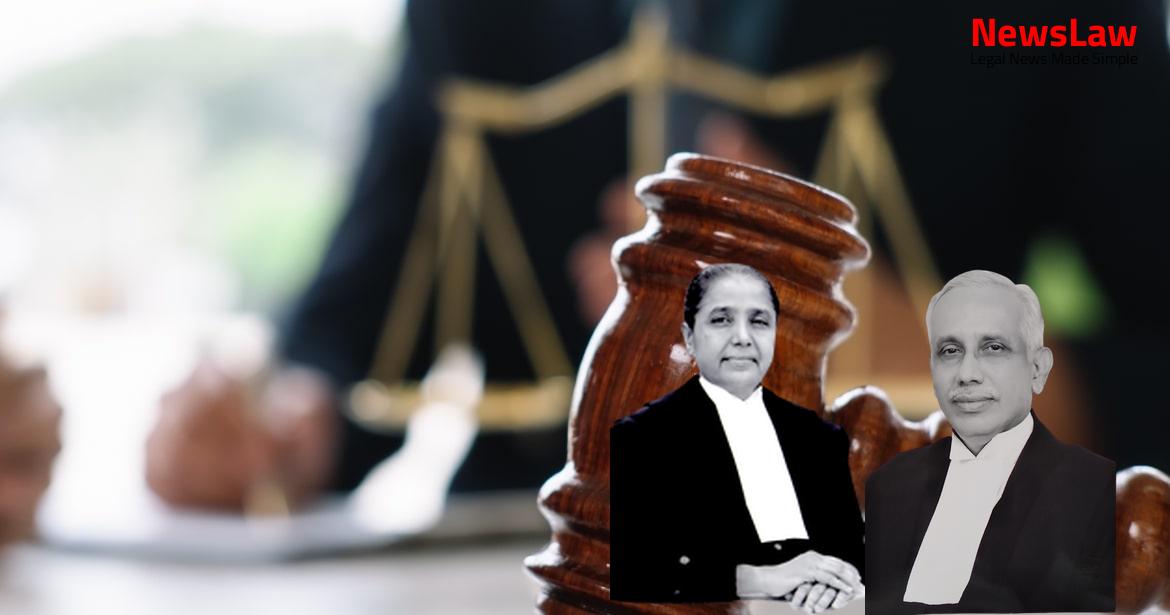In the recent judgment by the Supreme Court of India, the High Court affirmed the conviction and modified the sentence in the case involving Malita and Mondal. The altercation over a land dispute resulted in a tragic event, leading to legal consequences for the parties involved. The decision sheds light on the complexities of the legal system and the pursuit of justice. Stay tuned for more insights on this significant ruling.
Facts
- The High Court affirmed the conviction of the appellants under Sections 323, 341, 304 read with 34 IPC
- The High Court modified the sentence of the appellants from life imprisonment to fourteen years each
- The High Court directed the appellants to pay a fine of Rs. 10,000/- each with a default clause
- The High Court allowed the appeal filed by the co-accused (A-1 to A-5 and A-9) and acquitted them
- On the morning of 12 August, 2010, an altercation occurred between the deceased-Morshed Malita and accused-Hannan Mondal over a land dispute.
- The deceased-Morshed Malita was assaulted by the accused using weapons like lathi, ramda, and rod.
- Eye-witnesses Innach Malita (PW-1), Asraf Malita (PW-4), and Rajabul Malita (PW-5) rushed to the spot to rescue the deceased.
- Based on the oral evidence and the injuries sustained by the deceased, the Trial Court held the appellants and other accused guilty under Section 304 read with Section 34 IPC.
- The Trial Court sentenced the appellants and other accused to life imprisonment under Section 304 read with Section 34 and to rigorous imprisonment for one year under Section 323 read with Section 34 IPC.
- The High Court later acquitted the co-accused A-1 to A-5 and A-9.
Also Read: High Court’s Decision on Large Gala Allotment Dispute: Supreme Court Verdict
Arguments
- Mr. Subhasish Bhowmick, learned counsel for the appellants, presented arguments
- Arguments advanced by Mr. Subhasish Bhowmick were taken into consideration
- Mr. Avishkar Singhvi, learned counsel for the respondent-State, relied on the judgment in State of Punjab v. Bawa Singh, (2015) 3 SCC 441
- The appellants have been found guilty of committing the crime.
- The court has decided not to show any leniency towards the appellants.
- The judgment clearly states that no special treatment will be given to the appellants.
Also Read: High Court Acquittal Case of State of Uttar Pradesh v. Jai Prakash
Analysis
- The fight involved appellants-accused No.6, 7, and 8 attacking the deceased with sharp-edged weapons attached to long sticks.
- There was no premeditation or pre-plan to commit the murder of the deceased.
- The appellants were rightly convicted under Section 304 read with Section 34 of the IPC.
- The altercation between the parties continued from the morning to the evening when the occurrence happened.
- The deceased had an altercation with accused-Hannan Mondal at the time of the occurrence.
- The Trial Court and High Court did not specify under which ‘Part’ of Section 304 IPC the conviction of the appellants should be maintained.
- The appellants attacked the deceased, Morshed Malita, with ‘fala and ramda’, resulting in severe injuries including cut injuries on the chest, bruise on the left fore-arm, and punctured lungs.
- Considering the lack of premeditation, the appellants’ conviction under Section 304 read with Section 34 IPC is modified to Section 304 Part II IPC.
- The sentence of imprisonment for the appellants is reduced from fourteen years to ten years.
- The imprisonment sentences under Sections 341, 323, 304 r/w 34 IPC will run concurrently.
Also Read: Judgment Review: Supreme Court’s Ruling on the Capital Punishment Appeal
Decision
- Fine and default clause to remain intact
- The appeal is partly allowed
Case Title: NAZIR MALITA Vs. THE STATE OF WEST BENGAL
Case Number: Crl.A. No.-000807-000807 / 2019



